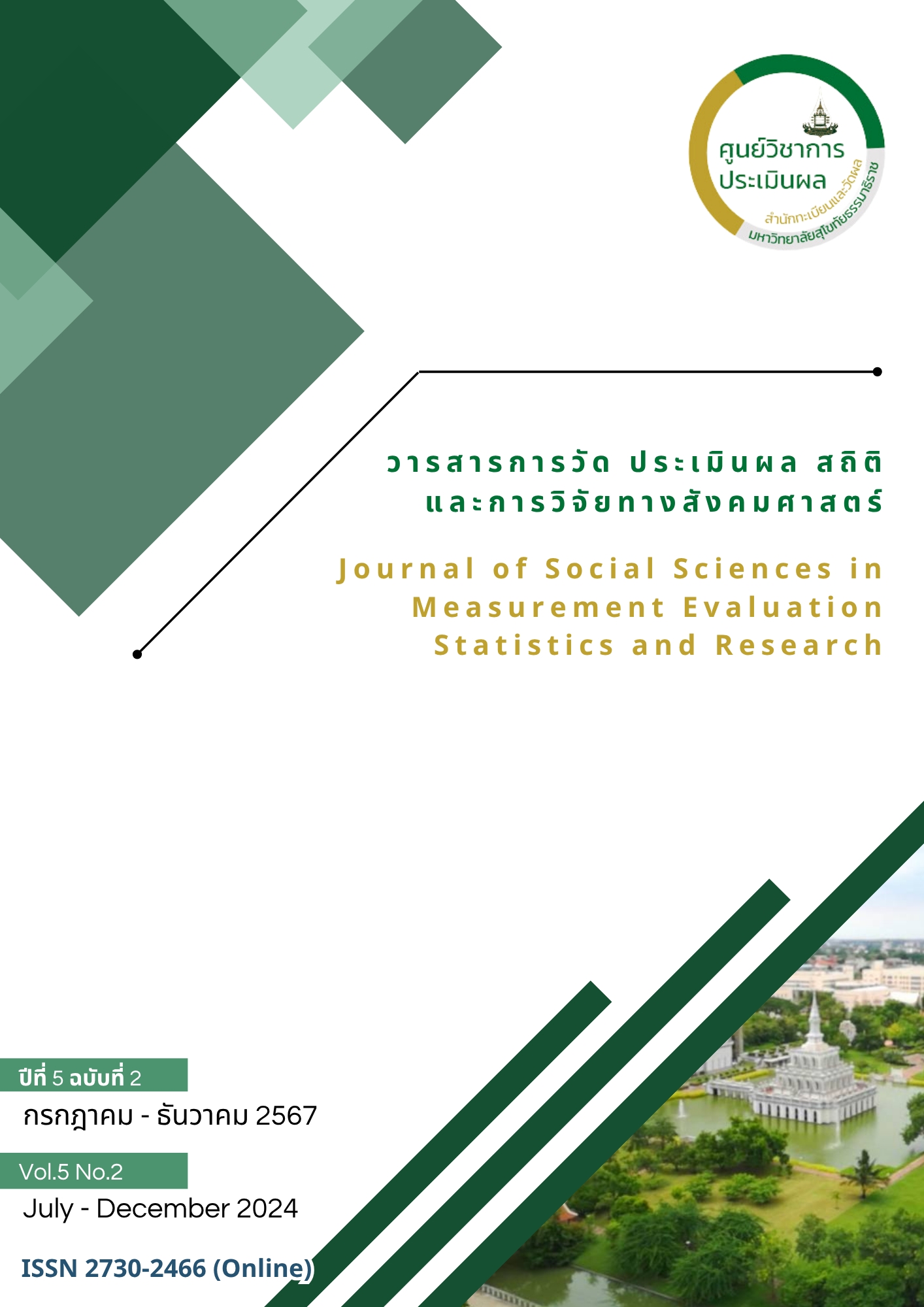การทบทวนวรรณกรรมอย่างเป็นระบบในการวิจัยทางการศึกษา
Main Article Content
บทคัดย่อ
การทบทวนวรรณกรรมอย่างเป็นระบบถือเป็นรูปแบบการวิจัยเพื่อรวบรวมองค์ความรู้ทางการศึกษาในหลายประเด็น เพื่อให้เป็นตัวช่วยในการตอบคำถามการวิจัยที่มีความสำคัญ โดยเฉพาะในส่วนของการออกแบบการเรียนรู้ การใช้เทคโนโลยีทางการศึกษา และการเรียนรู้ในรูปแบบต่าง ๆ กระบวนการทบทวนวรรณกรรมอย่างเป็นระบบมีขั้นตอนที่เข้มงวด รัดกุม และโปร่งใส เพื่อให้งานวิจัยมีคุณภาพและเป็นไปตามเป้าหมายที่ต้องการทราบ โดยมีขั้นตอนที่สำคัญ ได้แก่ 1) การกำหนดคำถามและวัตถุประสงค์การวิจัย 2) การสืบค้นงานวิจัย การค้นหาและรวบรวมงานวิจัยที่เกี่ยวข้องกับประเด็นที่ต้องการทราบ เพื่อให้เป็นแหล่งข้อมูลสำคัญในการทบทวนวรรณกรรม 3) การกำหนดเกณฑ์คัดเข้าและคัดออกงานวิจัย การตัดสินใจว่างานวิจัยใดควรเข้าร่วมกระบวนการทบทวนวรรณกรรมและงานวิจัยใดควรถูกตัดออก เพื่อรักษาคุณภาพและเป็นไปตามเป้าหมายของการทบทวน 4) การประเมินคุณภาพงานวิจัย การตรวจสอบและประเมินคุณภาพของงานวิจัยที่รวบรวมมา โดยใช้เกณฑ์ที่กำหนดไว้ และ 5) การสกัดข้อมูลและการรายงานผลการสังเคราะห์งานวิจัย การสกัดข้อมูลจากงานวิจัยที่เลือกเพื่อนำมาใช้ในการทบทวนวรรณกรรมอย่างเป็นระบบ และการสรุปและรายงานผลเพื่อนำข้อมูลไปสู่การพัฒนาการเรียนรู้และนโยบายที่เหมาะสม การทบทวนวรรณกรรมอย่างเป็นระบบนี้ช่วยให้นักวิจัยทางด้านการศึกษาสามารถรวบรวมองค์ความรู้ทางด้านการศึกษาอย่างมีระเบียบและมีคุณภาพเพิ่มขึ้น เพื่อนำมาใช้ในการพัฒนารูปแบบการเรียนรู้และนโยบายทางการศึกษาที่เหมาะสมต่อบริบทและความต้องการทางการศึกษาในปัจจุบันและอนาคต
Article Details

อนุญาตภายใต้เงื่อนไข Creative Commons Attribution-NonCommercial-NoDerivatives 4.0 International License.
ข้อความและบทความในวารสารการวัด ประเมินผล สถิติ และการวิจัยทางสังคมศาสตร์ เป็นแนวคิดของผู้เขียน มิใช่ความคิดเห็นของกองบรรณาธิการวารสาร จึงมิใช่ความรับผิดชอบของวารสารการวัด ประเมินผล สถิติ และการวิจัยทางสังคมศาสตร์ บทความในวารสารต้องไม่เคยตีพิมพ์ที่ใดมาก่อน และสงวนสิทธิ์ตามกฎหมายไทย การจะนำไปเผยแพร่ ต้องได้รับอนุญาตเป็นลายลักษณ์อักษรจากกองบรรณาธิการ
เอกสารอ้างอิง
Chiangkhong, A., Suwanwong, C., & Wongrostrai, Y. (2023). Lifestyle, clinical, and occupational risk factors of recurrent stroke among the working-age group: A systematic review and meta-analysis. Heliyon, 9(3), e13949. https://doi.org/10.1016/j.heliyon.2023.e13949
Howard, B., Diug, B., & Ilic, D. (2022). Methods of teaching evidence-based practice: A systematic review. BMC Medical Education, 22(1), 742. https://doi.org/10.1186/s12909-022-03812-x
Jahan, N., Naveed, S., Zeshan, M., & Tahir, M. A. (2016). How to conduct a systematic review: A narrative literature review. Cureus, 8(11), e864. https://doi.org/10.7759/cureus.864
Knogler, M., Hetmanek, A., & Seidel, T. (2022). Determining an evidence base for particular fields of educational practice: A systematic review of meta-analyses on effective mathematics and science teaching. Frontiers in Psychology, 13, 873995. https://doi.org/10.3389/fpsyg.2022.873995
Kolaski, K., Logan, L. M., & Ioannidis, J. P. A. (2023). Guidance to best tools and practices for systematic reviews. Systematic Reviews, 12, 96. https://doi.org/10.1186/s13643-023-02255-9
López-Nicolás, R., López-López, J. A., Rubio-Aparicio, M., & Sánchez-Meca, J. (2022). A meta-review of transparency and reproducibility-related reporting practices in published meta-analyses on clinical psychological interventions (2000-2020). Behavior Research Methods, 54(1), 334-349. https://doi.org/10.3758/s13428-021-01644-z
Munn, Z., Stern, C., Aromataris, E., Lockwood, C., & Jordan, Z. (2018). What kind of systematic review should I conduct? A proposed typology and guidance for systematic reviewers in the medical and health sciences. BMC Medical Research Methodology, 18, 5. https://doi.org/10.1186/s12874-017-0468-4
Newman, M., & Gough, D. (2020). Systematic reviews in educational research: Methodology, perspectives and applications. In O. Zawacki-Richter, M. Kerres, S. Bedenlier, M. Bond, & K. Buntins (eds.), Systematic reviews in educational research (pp. 3-22). Springer.
Page, M. J., McKenzie, J. E., Bossuyt, P. M., Boutron, I., Hoffman, T. C., Mulrow, C. D., Shamseer, L., Tetzlaff, J. M., Akl, E. A., Brennan, S. E., Chou, R., Glanville, J., Grimshaw, J. M., Hróbjartsson, A., Lalu, M. M., Li, T., Loder, E. W., Mayo-Wilson, E., McDonald, S., McGuinness, L. A., … Moher, D. (2021). The PRISMA 2020 statement: An updated guideline for reporting systematic reviews. BMJ, 371, n71. https://doi.org/10.1136/bmj.n71
Petticrew, M., & Roberts, H. (2006). Systematic review in the social sciences: A practical guide. Blackwell Publishing.
Polanin, J. R., Hennessy, E. A., & Tsuji, S. (2020). Transparency and reproducibility of meta-analyses in psychology: A meta-review. Perspectives on Psychological Science, 15(4), 1026-1041. https://doi.org/10.1177/1745691620906416
Polanin, J. R., Maynard, B. R., & Dell, N. A. (2017). Overviews in education research: A systematic review and analysis. Review of Educational Research, 87(1), 172-203. https://doi.org/10.3102/0034654316631117
Shi, Y., Pyne, K., Kulophas, D., & Bangpan, M. (2022). Exploring equity in educational policies and interventions in primary and secondary education in the context of public health emergencies: A systematic literature review. International Journal of Educational Research, 111, 101911. https://doi.org/10.1016/j/ijer.2021.101911
Sjölund, S., Lindvall, J., Larsson, M., & Ryve, A. (2022). Using research to inform practice through research-practice partnerships: A systematic literature review. Review of Education, 10(1), e3337. https://doi.org/10.1002/rev3.3337
Zawacki-Richter, O., Kerres, M., Bedenlier, S., Bond, M., & Buntins, K. (2020). Systematic reviews in educational research. Springer.


